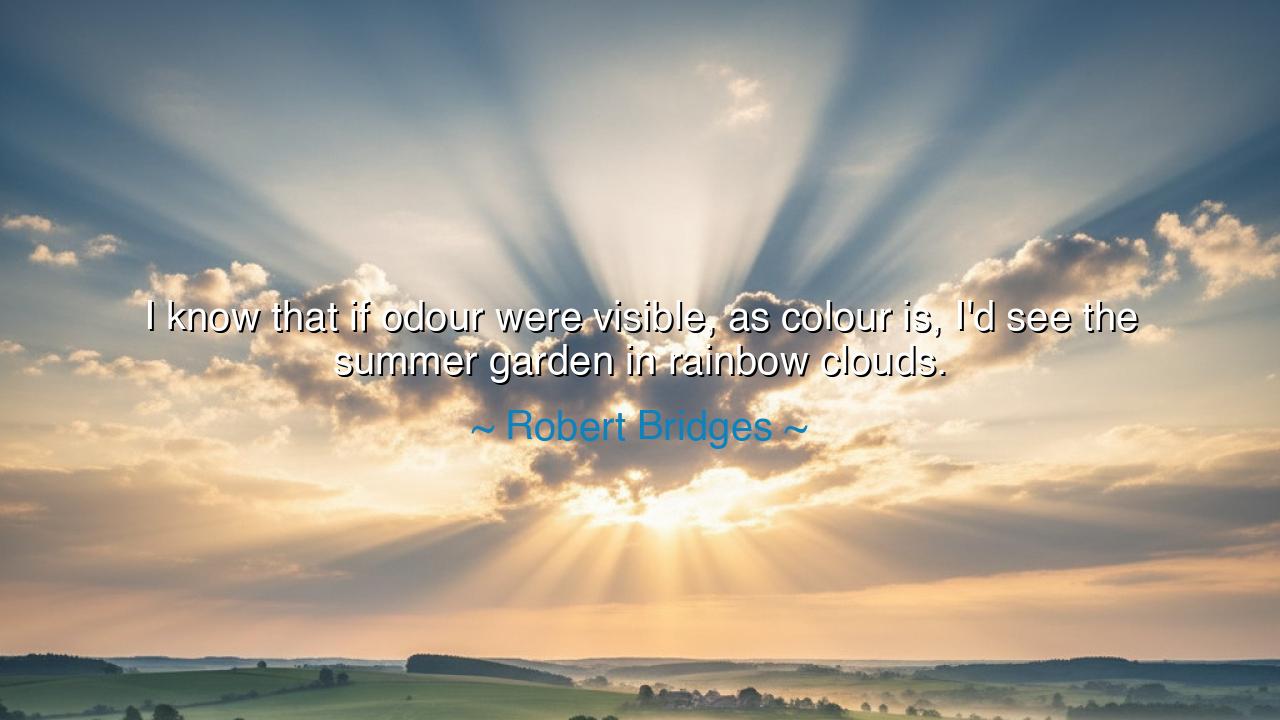
I know that if odour were visible, as colour is, I'd see the
I know that if odour were visible, as colour is, I'd see the summer garden in rainbow clouds.






Hear, then, the gentle vision of Robert Bridges, poet of England and lover of nature’s quiet mysteries, who wrote: “I know that if odour were visible, as colour is, I’d see the summer garden in rainbow clouds.” In this tender thought lies the union of poetry and perception — a revelation of how the unseen beauty of the world might appear if only the senses of the soul were sharpened. For Bridges, fragrance was not merely a scent that delights the nose; it was an invisible art, a hidden radiance moving through the air. He reminds us that what is unseen is no less glorious than what is visible, and that the deepest beauty often reveals itself only to those who pause, breathe, and truly attend.
Robert Bridges lived in an age when the garden was not just a collection of plants, but a sanctuary of spirit. A physician by training and a poet by calling, he saw in the natural world the harmony that civilization so often forgets. His words bloom from the same soil as those of the Romantics before him — Wordsworth, Keats, Shelley — who believed that the divine speaks through the living earth. But Bridges adds to their vision the subtlety of the invisible, the truth that beauty does not always wear the garments of sight. In his imagination, each flower’s scent becomes a hue; the summer garden transforms into a sky of drifting colours — lavender mist, golden rose, and emerald breeze. The poem is not a dream of fantasy, but a meditation on perception: how much splendour escapes us simply because our eyes cannot see it.
Think of it — if odour were visible, the humble garden would become a cathedral of light. Every rose would shimmer in crimson aura, every lily release pale ribbons of silver, and every herb, crushed beneath the hand, would rise in a luminous sigh. The air itself would move like living silk. In this vision, Bridges teaches that creation is layered, and our senses perceive but a fraction of its grace. The rainbow clouds of scent are symbols of all the wonders we overlook — the kindness unseen, the music unheard, the beauty that waits behind the veil of the ordinary.
So too in life, much of what sustains us is invisible: love, hope, faith, and memory. Like fragrance, they cannot be grasped by the eye, yet they fill the atmosphere of our days. Consider the life of Helen Keller, who, though blind and deaf, spoke of a world alive with scent, touch, and warmth. She once said, “Smell is a potent wizard that transports you across thousands of miles and all the years you have lived.” She, like Bridges, knew that the unseen carries the essence of life. The garden of summer was, for her, not a silent or colourless place, but one overflowing with sensations deeper than sight.
There is also in this quote a reverence for imagination, that divine faculty by which humanity partakes in creation itself. To imagine the fragrance of roses as rainbow clouds is to exercise the sacred gift of wonder — the same wonder that built cathedrals, composed symphonies, and painted skies on canvas. In Bridges’ vision, the poet becomes like a priest of perception, interpreting the hidden light of the world. He calls upon us to live as poets too — to see more than the eye can see, to sense the harmony that hums beneath the surface of all things.
The summer garden stands also as a symbol of abundance — the fullness of life when it is at its height. The mingling scents of blossoms, herbs, and warm soil are the very breath of creation. To imagine those scents as visible is to see the soul of nature revealed. It is a vision of unity, where every fragrance contributes to one great, living rainbow. So too must human life be lived — not in isolation, but in harmony, where each act of goodness, each kindness and creation, adds its own hue to the invisible tapestry of the world.
Thus, the lesson of Robert Bridges’ words is this: learn to see the unseen. Train your heart to perceive the invisible beauty that moves through the air — the love that fills a room, the patience of the growing seed, the quiet music of the dawn. The world is richer than your senses admit; its splendour is not confined to what you can measure or behold.
And so, dear listener, when next you walk through your own garden, whether of flowers or of life, pause and breathe deeply. Let the scents remind you of the unseen miracles surrounding you. Imagine them as rainbow clouds, weaving through the air, painting what your eyes cannot perceive. For in that moment, you will stand, as Robert Bridges did, not merely in a garden — but in the very presence of creation itself.






AAdministratorAdministrator
Welcome, honored guests. Please leave a comment, we will respond soon